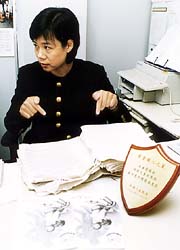



















| |

WCIP Lo (right) discusses Police Force support for victims of domestic violence with Harmony House executive director Edith Chang | HARMONY HOUSE,
a non-governmental agency which provides temporary accommodation for battered women and their
children, recently presented its Professional Caring Star award to Woman Chief Inspector Yvonne Lo
of the Child Protection Policy Unit. It also gave its Professional Services Organisation award to
personnel of the Aberdeen, Ma On Shan, Tsuen Wan and Tai Po Police Stations in praise of their
assistance to victims of domestic violence.
"We selected WCIP Lo because of her continuous contribution in promoting concern about domestic violence among the members of the Hong Kong Police Force. She also provides a lot of training assistance on these matters within the Force and is a good communication channel between the Police and Harmony House," said Edith Chang Pui-lai, Executive Director of Harmony House. |
|
"The selection criteria of the Professional Services Organisation is based on the quality and the quantity of support from the organisations, including the opinion of our phone hotline workers and users of our shelter," added Ms Chang. "Because frontline police officers are usually the first point of contact for victims of domestic violence, it is extremely important that we have the support of our police." And Harmony House has the support of the Force. Together with representatives of agency, WCIP Lo has over the last three years helped to raise awareness of the issue of domestic violence among Force members through presentations to Command Courses. She has also provided support and advice to non-government organisations dealing with victims of domestic violence, and continues to work closely with the Social Welfare Department in formulating Government and Force policy and procedures in handling incidents of domestic violence. A Headquarters Order on Force procedures was published in December 1995 and a training video demonstrating these new procedures was produced and distributed to districts for use on training days. In 1996, multi-disciplinary guidelines were drawn up to help deal with cases involving battered women. And in 1997, domestic violence was included in the syllabus of PI and RPC training courses. "And we continue to conduct talks on the subject at police stations throughout the territory," said Harmony House's Edith Chang, "at which time frontline police officers explain their working procedures and guidelines to us and in return we express the expectation of victims of domestic violence to police officers." NTN Regional Commander Wong Leung Kam-shan said the Force handled 820 domestic violence cases between April 1996 and March 1997. "Although the 382 cases between April and September 1997 have indicated a slight drop, we remain committed to the problem. Force representatives meet regularly with the Working Group on Battered Spouses of Social Welfare Department, voluntary agencies and other professionals." Currently, the Force's Crime Protection Policy Unit keeps statistics on reported incidents of domestic violence based on figures compiled from each District. In Aberdeen, DVC Cheung Tak-yiu said all frontline officers of his station are very familiar with the procedures of tackling these cases and know the appropriate approach of referring cases to Harmony House or the Social Welfare Department. "Where incidents are amicably settled, officers now recommend that both parties consider attending the Social Welfare Department Family Services Centre or the Family Service Centres of non-Government Organisations for counselling." Acting DVC Tsuen Wan, Law Cheuk-hung, said that because of the frequency of cases of domestic violence "our report room personnel have been trained to deal sympathetically and effectively with victims of this crime, who often feel embarrassed or ashamed about disclosing such private family matters. When such circumstances occur, a quieter room in which to make a statement is offered by our duty officers." In terms of service quality, SIP OSSUC Tai Po DIV, So Kam-cheung, said that because new immigrant victims of domestic violence in his division seldom have relatives nearby to run to, they come (usually around midnight) to Tai Po Police Station which now allows them to stay in the station until the next morning when they are referred to a proper government or voluntary agency. But if you think only women are battered, think again. DVC Ma On Shan, Mak Wai-chuen said: "Cases are not simply related to men beating women. We've seen incidents here where men are battered by their wives after they discover they have a mistress in China or somewhere else. In one case, an angry wife poured a pot of boiling oil on her husband after he went to sleep." Along with the Hong Kong Police Force, five organisations including some offices of the Social Welfare Department and other voluntary agencies were also singled out by Harmony House as Professional Services Organisations. | |
 |
"BEING considerate, caring, patient and open-minded is
very important for police officers handling cases of domestic violence," said WCIP Yvonne Lo, recipient
of the Professional Caring Star award from Harmony House.
WCIP Lo's work on domestic violence started in 1992 when she was an instructor at the Police Training School and the Force Working Group on Domestic Violence invited her to assist in the production of a training video on dealing with domestic violence in terms of the police role and their powers, as well as procedures with which to handle these kind of cases. "WSP Patricia Walsh (who has since retired from the Force) of the Child Protection Policy Unit chaired the Working Group at that time," said WCIP Lo, who was a social worker before joining the Force. "She invited me to become a member of the Working Group." |
|
In 1995 WCIP Lo was transferred to the Child Protection Policy Unit, Crime Wing Headquarters, which was tasked to take over the work of the Working Group. WCIP Lo emphasised that her award is shared by all Force members who have helped to promote awareness of the problem and aided victims of domestic violence, in particular former WSP Walsh. "The primary concerns of an officer attending scenes of domestic violence," explained WCIP Lo, "are to protect the victim from further attack; to ensure that the victim and any children are not at risk and, if necessary, to offer medical treatment to the victims. Officers must take firm and positive action against the alleged offender and investigate any offences which may have been committed." A Domestic Incident Notice is a record of a victim's complaint against the alleged offender on whom it is served. It draws the offender's attention to legislation that she/he may contravene if she/her repeats her/his actions. However, if a victim wishes to pursue a criminal complaint against the alleged offender, and there is sufficient evidence to support a charge and the victim is willing to give evidence in criminal proceedings, then the appropriate criminal charge should be laid. Domestic Incident Notice documents should be kept in every Report Room and carried on all mobile patrol and EU vehicles. WCIP Lo said victims of domestic violence are often distressed and traumatised -particularly if they have been assaulted. Officers are trained to consider the victim's safety and offer police transport, if available, to the victim's friends or relatives, or such refuges as Harmony House, the Social Welfare Department's Wai On Home, or the Christian Family Service Centre's Serene Court whose shelter addresses should remain unknown to the alleged offender or the general public. "If the victim is female, police have been trained to have a woman officer speak to her," said WCIP Lo. "The victim and alleged offender must be separated so that the victim does not feel pressured into relating the incident in front of the alleged offender. Neither should the victim should be asked in the presence of the alleged offender if she wants to bring a criminal complaint against the alleged offender and give evidence at a court hearing." She adds: "I cannot stress how important it is that police continue to learn how to deal with cases of domestic violence. Improper action can cause serious harm. Domestic violence can easily evolve into a more serious criminal incident such as serious wounding, manslaughter, murder or suicide." WCIP Lo suggests all police familiar with The Victims of Domestic Violence Advice Card which outlines the role and powers of police officers, introduces district court injunction orders, legal aid hotlines, and details social services and shelters available for battered women and their children, as well as legal advice clinics operated by the Federation of Women's Centres. | |

![]()
